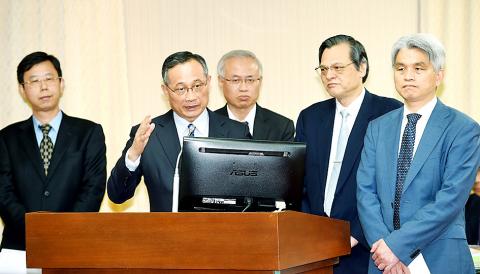The Ministry of Justice’s Investigation Bureau is investigating 33 cases of alleged Chinese funding to candidate campaigns for the Nov. 24 elections, bureau Director-General Leu Wen-jong (呂文忠) said yesterday.
Asked by Chinese Nationalist Party (KMT) caucus deputy secretary-general William Tseng (曾銘宗) during a meeting of the legislature’s Internal Administration Committee whether the suspect funds were coming directly from the Chinese government or affiliated organizations, Leu said: “You could say that.”
Many of the cases involved donations made through Taiwanese businesses in China, Leu said.

Photo: Fang Pin-chao, Taipei Times
When Tseng asked if any of the donations could have simply been made by those businesses, without Chinese help, Leu said the bureau has evidence that China is attempting to influence the elections by funding certain candidates and is preparing cases for prosecution.
If Taiwanese businesses were making the donations on their own, they would be legal, but the Political Donations Act (政治獻金法) and the Act Governing Relations Between the People of the Taiwan Area and the Mainland Area (台灣地區與大陸地區人民關係條例) prohibit donations made by Chinese individuals or entities, Leu said.
China has been attempting to circumvent these laws by making donations in other ways, such as through China-based Taiwanese businesses, with the money coming from China’s Taiwan Affairs Office, he said.
Four cases that are being investigated by prosecutors in Taipei and Changhua, Yunlin and Pingtung counties are being treated as alleged vote-buying, the bureau said.
Leu said Beijing had also invited some influential community leaders to visit China on all-expenses-paid trips in return for their backing of China’s favored candidates, but he would not give more details when pressed by committee members.
The bureau has identified certain candidates it believes are being funded by Beijing and it is building cases against them, he added.
The Taiwan High Prosecutors’ Office has conducted raids on two underground money exchanges, he said.
The raids were part of preparations for next month’s meeting of the Asia/Pacific Group on Money Laundering and aimed at cracking down on campaign violations, as some money meant to influence the elections has been flowing into the exchanges from China, he said.
Mainland Affairs Council Minister Chen Ming-tong (陳明通) told the committee that the council was already looking into the cases, but needed more specific information from the bureau.
Meanwhile, Minister of Justice Tsai Ching-hsiang (蔡清祥) called on the police to step up measures against foreign interference in next month’s elections.
Additional reporting by CNA

INVESTIGATION: The case is the latest instance of a DPP figure being implicated in an espionage network accused of allegedly leaking information to Chinese intelligence Democratic Progressive Party (DPP) member Ho Jen-chieh (何仁傑) was detained and held incommunicado yesterday on suspicion of spying for China during his tenure as assistant to then-minister of foreign affairs Joseph Wu (吳釗燮). The Taipei District Prosecutors’ Office said Ho was implicated during its investigation into alleged spying activities by former Presidential Office consultant Wu Shang-yu (吳尚雨). Prosecutors said there is reason to believe Ho breached the National Security Act (國家安全法) by leaking classified Ministry of Foreign Affairs information to Chinese intelligence. Following interrogation, prosecutors petitioned the Taipei District Court to detain Ho, citing concerns over potential collusion or tampering of evidence. The

‘FORM OF PROTEST’: The German Institute Taipei said it was ‘shocked’ to see Nazi symbolism used in connection with political aims as it condemned the incident Sung Chien-liang (宋建樑), who led efforts to recall Democratic Progressive Party (DPP) Legislator Lee Kun-cheng (李坤城), was released on bail of NT$80,000 yesterday amid an outcry over a Nazi armband he wore to questioning the night before. Sung arrived at the New Taipei City District Prosecutors’ Office for questioning in a recall petition forgery case on Tuesday night wearing a red armband bearing a swastika, carrying a copy of Adolf Hitler’s Mein Kampf and giving a Nazi salute. Sung left the building at 1:15am without the armband and apparently covering the book with a coat. This is a serious international scandal and Chinese

Seventy percent of middle and elementary schools now conduct English classes entirely in English, the Ministry of Education said, as it encourages schools nationwide to adopt this practice Minister of Education (MOE) Cheng Ying-yao (鄭英耀) is scheduled to present a report on the government’s bilingual education policy to the Legislative Yuan’s Education and Culture Committee today. The report would outline strategies aimed at expanding access to education, reducing regional disparities and improving talent cultivation. Implementation of bilingual education policies has varied across local governments, occasionally drawing public criticism. For example, some schools have required teachers of non-English subjects to pass English proficiency

TRADE: The premier pledged safeguards on ‘Made in Taiwan’ labeling, anti-dumping measures and stricter export controls to strengthen its position in trade talks Products labeled “made in Taiwan” must be genuinely made in Taiwan, Premier Cho Jung-tai (卓榮泰) said yesterday, vowing to enforce strict safeguards against “origin laundering” and initiate anti-dumping investigations to prevent China dumping its products in Taiwan. Cho made the remarks in a discussion session with representatives from industries in Kaohsiung. In response to the US government’s recent announcement of “reciprocal” tariffs on its trading partners, President William Lai (賴清德) and Cho last week began a series of consultations with industry leaders nationwide to gather feedback and address concerns. Taiwanese and US officials held a videoconference on Friday evening to discuss the